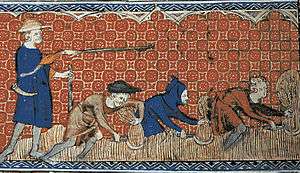Socage
Socage (/ˈsɒkɪdʒ/)[1] was one of the feudal duties and hence land tenure forms in the feudal system. A farmer, for example, held the land in exchange for a clearly defined, fixed payment to be made at specified intervals to his feudal lord, who in turn had his own feudal obligations, to the farmer (principally those of protection) and to the Crown. In theory this might involve supplying the lord with produce but most usually it meant a straightforward payment of cash, i.e., rent.

It contrasted with other forms of tenure including serjeanty (the farmer paid no rent but had to perform some personal/official service on behalf of his lord, including in times of war) and frankalmoin (some form of religious service). For those higher in the feudal hierarchy, there was also knight-service (military service) as a condition of land tenure.
The English statute Quia Emptores of Edward I (1290) established that socage tenure passed from one generation to the next (or one nominee to the next such as newly appointed feoffees/trustees (to uses/trusts)) subject to inquisitions post mortem which would mean a one-off tax (a "feudal relief"). This contrasts with leases which could be for a person's lifetime or readily subject to forfeiture and rent increases. As feudalism declined, the prevalence of socage tenure increased until either it became the normal form of head tenure in the Kingdom of England (all types enabling grants underneath it of any leases or subleases, as today but also copyhold where lord of the manor). In 1660, the Statute of Tenures ended estates requiring the owner to provide (with the "incidents" of) military service and most freehold tenures (and other "estates of inheritance") were converted into "free and common socage".
The holder of a soc or socage tenure was referred to as a socager (Anglo-Norman) or socman (Anglo-Saxon, also spelt sochman, from the legal concept of a soke, from the verb 'to seek').[2] In German-speaking Europe, the broad equivalent was a Dienstmann. The etymology of socage according to William Blackstone is the old Latin word for a plough.
See also
- Soke (legal)
- Quia Emptores (statute of), 1290 - also strengthened the devise/use of trusts, i.e. the holding of land or other assets for beneficiaries (equitable owners) other than the trustees (legal owners)
- Computo (writ of production of accounts, commonly obtained at the end administration of such an estate by a guardian)
- Corvée, physical work as a form of rent, largely abolished in England on the abolition of serfdom
- History of English land law
References
- Wells, John C. (1990). Longman pronunciation dictionary. Harlow, England: Longman. p. 658. ISBN 0-582-05383-8. entry "socage"
- Partington, S W (1909), "2", The Danes in Lancashire and Yorkshire, retrieved 2012-05-15,
Tenants who owned such tenures were called 'sochmen', and the tenure itself was called 'socage'
External links
- Vinogradoff, Paul (1911). . Encyclopædia Britannica (11th ed.).
Soccage in Lower Canada: An act to explain and amend the laws relating to lands holden in free and common soccage in the province of Lower Canada